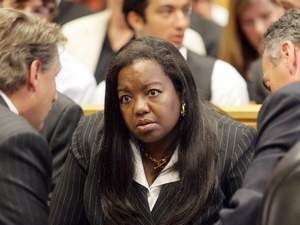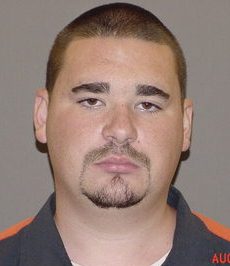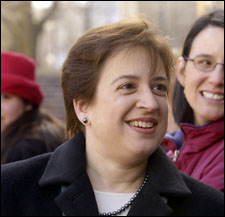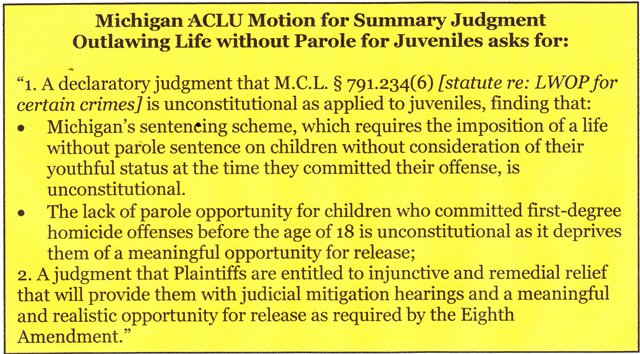
- Some of Michigan’s 371 juvenile lifers involved in current litigation: (l to r, top through bottom row), Cortez Davis and Raymond Carp, awaiting re-sentencing under USSC decision; plaintiffs in USDC case Henry Hill, Keith Maxey, Dontez Tillman, Jemal Tipton, Henry Hill, Nicole Dupure, Giovanni Casper, Jean Cintron, Matthew Bentley, Bosie Smith, Kevin Boyd, Damion Todd, and Jennifer Pruitt; Edward Sanders and David Walton, in prison since 1975 at the age of 17; (photos show some lifers at current age, others at age they went to prison).
- State AG Schuette wants them to die behind bars
- AG lost Davis case; re-sentencing set for Nov. 16, 2012
- AG now part of Raymond Carp appeals case
- USDC Judge O’Meara considering answer to Mich. ACLU motion; his ruling could override appeals court on Carp
By Diane Bukowski
October 25, 2012
DETROIT—Despite the Michigan Supreme Court’s refusal Sept. 7 to halt the re-sentencing of Cortez Daviz (shown above), Michigan’s Attorney General Bill Schuette is continuing his crusade to have Davis and the rest of Michigan’s 371 juvenile lifers die behind bars.
Michigan has the second highest number of juvenile lifers in the country. Seventy-four percent of them are prisoners of color, according to a study by the Michigan chapter of the American Civil Liberties Union (ACLU).
Davis, of Detroit, was 16 when he was sent to prison in 1993 in a felony murder case. But in June, the U.S. Supreme Court outlawed mandatory juvenile life without parole sentences for any crime, in Miller v. Alabama and Jackson v. Hobbs.

- Wayne Co. Prosecutor Kym Worthy listens to top assistant prosecutors including Robert Moran (r) during court hearing.
The Michigan Supreme Court refused to hear arguments from Schuette and Wayne County Prosecutor Kym Worthy against Davis’ re-sentencing.
“We REMAND this case to the Wayne County Circuit Court for reconsideration of the defendant’s successive motions for relief from judgment in light of Miller v. Alabama . . . .including the question whether Miller applies retroactively to cases that have become final on direct review,” the state high court wrote.
Wayne County Circuit Judge Massey Jones is now set to conduct Davis’ re-sentencing hearing on Nov. 16, 2012 at 9 a.m.
“We’re pretty excited to have this back at the trial court,” attorney Dylan DuVall, who along with Clinton Hubbell represents Davis, said in published remarks. “That’s where they belong, in the community where they occurred, where the judge is familiar with the case.”
He said he and Hubbell will ask that Davis be re-sentenced to time served.
“We are not victimizing the community or anyone else with these re-sentencings,” Hubbell said earlier. “The individuals in question did not actually commit the offense for which they were sentenced, first-degree murder, and they had diminished culpability as juveniles.”
Now Schuette has gone after Raymond Carp, 15 when he was sent to die in prison in 2006 for a murder his adult brother confessed to committing in Michigan’s St. Clair County. His brother testified that Carp did not actively participate in the crime, although a hearsay witness told the court that Carp confessed his participation to him.
Schuette (pronounced “shooty”) has said he considers all juvenile lifers “teen-age murderers” despite a study showing that the majority were not the “principal actors” in the crimes involved.
“Hauling hundreds of crime victims and their families back into court to relive these horrific murders would be cruel, unusual, and unnecessary,” Schuette said in a release, repeating terms U.S. Supreme Court Justice Elena Kagan used to characterize sentencing children to death in prison. The USSC ruled that such sentencing violated the Eighth Amendment.
“Fortunately that scenario can be avoided by following established court precedent that says U.S. Supreme Court rulings addressing criminal justice processes are not retroactive.”
A Michigan Court of Appeals panel heard Carp’s case Oct. 16. Schuette and the state prosecutors’ association faced a formidable array of adversaries. They included the State Appellate Defenders’ Office (SADO), the Criminal Defense Attorneys of Michigan (CDAM), the Michigan Chapter of the American Civil Liberties Union (ACLU), and the University of Michigan Law School Juvenile Justice Clinic.

- Kuntrell Jackson and Evan Miller were both 14 when they were sentenced to death in prison in Arkansas and Alabama, respectively.
These and other organizations have promised to represent every one of Michigan’s juvenile lifers, beginning with those who were not the principal actors and have served the longest terms. They contend that Miller v. Alabama is clearly retroactive.
Presiding Judge Michael Talbot was on the panel that denied Carp’s earlier appeal. In 1986, as a Detroit Recorders’ Court Judge, he caused gasps when he sentenced Damion Todd (shown in group photo above), 17, to mandatory life in prison without parole at hard labor and in solitary confinement, for murder. He added another term of 100 to 200 years for assault with intent to commit murder.

- Charles Jones with daughter Aiyana Stanley-Jones before her shooting death by Detroit police officer Joseph Weekley.
Talbot was on the appeals panel that summarily overturned Wayne County Circuit Court Judge Richard Skutt’s recent ruling barring “jail-house snitch” Jay Schlenkerman from testifying against Charles Jones, the father of Aiyana Stanley-Jones.
The child was seven when Detroit police officer Joseph Weekley shot her to death. Jones’ attorney, from Geoffrey Fieger’s firm, is asking the state Supreme Court to overturn the appeals ruling.
Ignoring the state high court’s refusal to weigh in on Miller, Talbot questioned whether the USSC ruling was “substantive” during the Oct. 16 hearing.
“If Kagan had the votes, she would have said it was substantive. But it’s not clear because she didn’t,” Talbot said.
“Rulings are deemed substantive if they prohibit a certain category of punishment for a class of offenders on the basis of their status or offense,” Carp’s attorney Patricia Selby countered. “In this case… what they banned was mandatory application without parole.”
She said that Miller v. Alabama clearly reflected the intent of the USSC, since the court previously banned mandatory death sentences as well as mandatory juvenile life without parole in non-homicide cases.
“We think because this involves something as significant as the Eighth Amendment,” Selby said, “that it should apply, and that it’s basically telling the courts they have to take a whole new look at people in Mr.Carp’s position.”
 SADO Attorney Jonathan Sacks stressed the Supreme Court’s ruling mandating individualized sentencing for juveniles, based on seven factors (see sidebar.)
SADO Attorney Jonathan Sacks stressed the Supreme Court’s ruling mandating individualized sentencing for juveniles, based on seven factors (see sidebar.)
Sacks and Selby also asked the court to consider changing first-degree sentences for juvenile lifers to second-degree sentences, which would automatically allow parole.
Edward Sanders is one of the state’s longest-serving juvenile lifers, having gone to prison in 1975 at the age of 17 for a drive-by killing in which he was not the shooter. He has now been assigned an attorney, Susan Reed, who is currently preparing his motion for re-sentencing.
Sanders, who obtained his bachelor’s degree while incarcerated and functions as a “jail-house lawyer,” said that he had offered the ACLU his input on the issue of substituting second-degree sentencing before the Oct. 16 hearing.
“I noted a precedent, People v. Jenkins, 395 MI (1975), which remanded a case to the trial court for re-sentencing due to a failure to instruct the jury on the possibility of a second-degree charge,” Sanders said.
The Michigan ACLU report says that juveniles, who are not familiar with legal options and frequently have court-appointed attorneys, often turn down pleas to lesser offenses.
Sanders’ co-defendant David Walton (in group photo bottom right) was also 17 at the time of the alleged crime. Another occupant of the car, under severe pressure from prosecutors and now retired Detroit Police Deputy Chief James Younger, testified that Walton was the shooter. That individual tried to hang himself during a break in the trial according to transcripts.
Younger went on to head the city’s notorious Gang Squad, which since has been severely cut back due to criticisms of its methods. The Detroit Police Department has been under federal oversight since 2001 for issues including excessive force and wholesale witness round-ups, which occurred in the Sanders-Walton case.
Just prior to the Carp hearing, U.S. District Court Judge John Corbett O’Meara of Michigan’s Eastern District heard a motion Sept. 20 for “summary judgment and equitable relief” in a long-standing federal lawsuit filed by the state ACLU on behalf of 13 juvenile lifers. His ruling in that case may supercede whatever the Appeals Court decides.
Judge Corbett O’Meara earlier refused to dismiss the case as the state requested.
Attorney Deborah LaBelle argued the motion, filed on the heels of the U.S. Supreme Court decision. It asks that state law allowing juvenile life without parole accordingly be found unconstitutional.
“As parents, teachers and older siblings, we inherently understand that kids are fundamentally different than adults,” LaBelle said in May while announcing the release of a report, Basic Decency: An Examination of Natural Life Sentences for Michigan Youth.
“They are impulsive, inexperienced, vulnerable to mistreatment, and are not able to easily escape or cope with abuse and other trauma. While there is no denying that youth must be held accountable for actions, as a state, we can do better than sentencing them to die in prison.”
During the Carp hearing, Judge Talbot asked attorneys for both sides to come up with proposals for legislative solutions to comply with the U.S. Supreme Court decisions. However, recent actions in other states show there are pitfalls in such solutions.
The state with the highest number of juvenile lifers is Pennsylvania, with 444. The Pennsylvania State House voted 174-20 on Oct. 20 for a measure that would give defendants under age 15 at least 20 years for second-degree murder and 25 years for first-degree murder. Those 15-17 would receive minimum sentences of 25 and 35 years respectively. The measure is supported by Pennsylvania’s Republican Governor Tom Corbett, according to a report from the national Campaign for the Fair Sentencing of Youth.
In California, where more than 309 juvenile lifers are incarcerated, the third highest number in the U.S., Governor Jerry Brown signed a measure Sept. 30 allowing juvenile lifers to ask judges to reconsider their sentences after at least 15 years in prison. The judges would then be able to reduce no-parole sentences to 25-years to life.
Previously, Iowa Governor Terry Branstad commuted the sentences of the state’s 38 juvenile lifers to 60 years, a measure roundly condemned by youth advocates as unduly harsh.
None of the states’ legislative remedies appear to allow for individual consideration of cases by the sentencing judges as Miller mandates, although California’s measure has been hailed by some opponents of juvenile life without parole.
Related documents, links and articles:
http://www.aclumich.org/sites/default/files/file/BasicDecencyReport2012.pdf.
http://secondchances4youth.org/basicdecency/
http://eji.org/ (Equal Justice Initiative, which won Miller v. Alabama, Hobbs v. Jackson.)
To download and print copy of this story in PDF, click on Michigan juvenile lifers want state to comply with US Supreme Court ruling VOD.













I’m truly enjoying the design and layout of your site. It’s a very easy on
the eyes which makes it much more enjoyable for me to come here and visit more
often. Did you hire out a developer to create your theme?
Great work!
This article mentions that Edward Sanders was “assigned” an attorney (Susan Reed). Can anyone offer an clarification as to this assignment? Was it through one of the organizations mentioned in the article which have promised to represent these defendants? Or was it through a court program? Thanks!